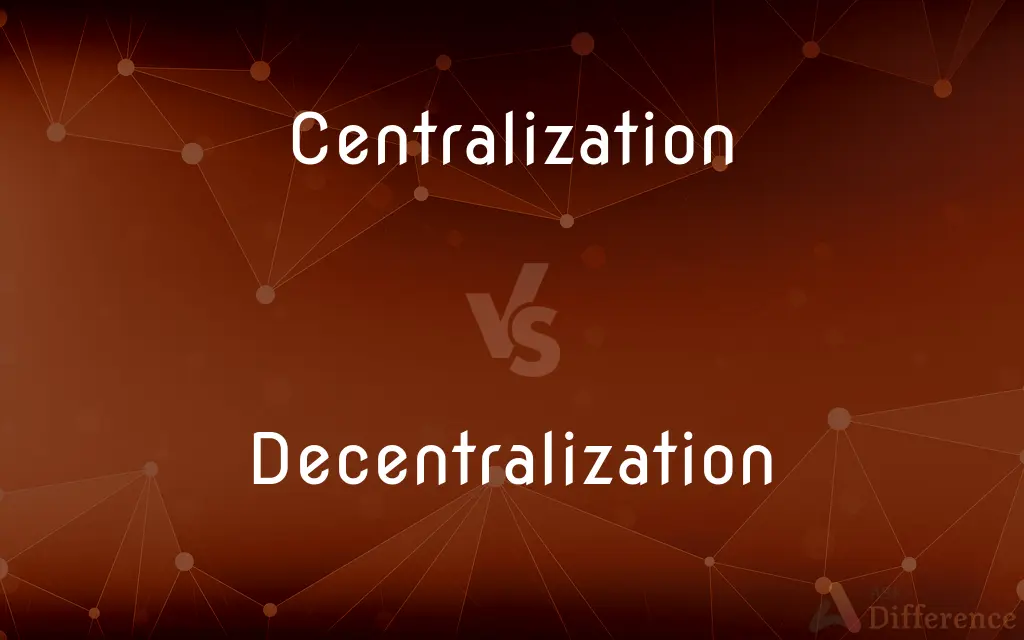Centralization vs. Decentralization — What's the Difference?
By Tayyaba Rehman — Updated on September 22, 2023
Centralization means consolidating power or control in a single central authority, while Decentralization distributes power away from the center to various units or locations.

Difference Between Centralization and Decentralization
Table of Contents
ADVERTISEMENT
Key Differences
Centralization and Decentralization are concepts that dictate how authority, responsibility, or resources are distributed within a structure or system. Centralization refers to the concentration of control, often within a specific hierarchical level or a single location. This approach can offer streamlined decision-making and consistent strategies. Conversely, Decentralization emphasizes the dispersion of control, allowing local units or different levels within the hierarchy to have autonomy.
In many organizations, the choice between Centralization and Decentralization is pivotal. A centralized approach might lead to quicker decisions, as fewer individuals are involved. However, with Decentralization, decisions might better reflect the unique needs and knowledge of local contexts or specific departments.
Economies also grapple with these concepts. Economies with Centralization have a strong central governing body making significant decisions, ensuring consistency across regions. In contrast, in a decentralized economy, local governments might have more autonomy, tailoring strategies to their regions' unique challenges and opportunities.
Technological advancements, especially in the world of digital currencies, also highlight the contrast between Centralization and Decentralization. Centralized digital platforms have a single control point, potentially offering more stability. However, decentralized platforms, like many blockchain systems, operate without a central authority, potentially offering more resilience and transparency.
Comparison Chart
Definition
Concentrating control in a single central point
Distributing control across various points or levels
ADVERTISEMENT
Decision-making
Faster due to fewer decision-makers
Slower but can be more contextual
Flexibility
Less, due to a standardized approach
More, as it allows for local adaptations
Risk and Failures
Central point of failure
Reduced single points of failure
Best for
Uniform policies and consistent strategies
Diverse contexts needing tailored strategies
Compare with Definitions
Centralization
The act of bringing activities or processes to a single point.
The Centralization of data servers improved the company's security.
Decentralization
The process of dispersing authority.
Decentralization of the national government gave more power to local councils.
Centralization
Concentration of control or authority.
Centralization of power in monarchies was common historically.
Decentralization
Allowing autonomy to various units within a structure.
The company's Decentralization strategy improved local responsiveness.
Centralization
Consolidation of functions or departments.
The Centralization of customer service departments boosted efficiency.
Decentralization
Dispersing resources or functions.
Decentralization of the production facilities catered to regional demands.
Centralization
Bringing resources to a core location.
The Centralization of research labs fostered better collaboration.
Decentralization
Distributing functions, power, or people away from a central location.
Decentralization allowed regional offices more decision-making autonomy.
Centralization
Systematic and consistent unification.
Centralization of branding ensures the company's image remains consistent globally.
Decentralization
Reduction in the concentration of control.
Blockchain's popularity stems from its Decentralization and security features.
Centralization
To draw into or toward a center; consolidate.
Decentralization
Decentralization or decentralisation is the process by which the activities of an organization, particularly those regarding planning and decision making, are distributed or delegated away from a central, authoritative location or group.Concepts of decentralization have been applied to group dynamics and management science in private businesses and organizations, political science, law and public administration, economics, money and technology.
Centralization
To bring under a single, central authority
The Constitution centralizes political power in the federal government.
Decentralization
To distribute the administrative functions or powers of (a central authority) among several local authorities.
Centralization
To come together at a center; concentrate.
Decentralization
To bring about the redistribution of (an urban population and industry) to suburban areas.
Centralization
The act or process of centralizing, or the state of being centralized; the act or process of combining or reducing several parts into a whole
The centralization of power in the general government
The centralization of commerce in a city
Decentralization
To cause to withdraw or disperse from a center of concentration
Decentralize a university complex.
Decentralize a museum.
Centralization
The act or process of centralizing, or the state of being centralized; the act or process of combining or reducing several parts into a whole; as, the centralization of power in the general government; the centralization of commerce in a city.
Decentralization
To undergo redistribution or dispersal away from a central location or authority.
Centralization
The act of consolidating power under a central control
Decentralization
The action of decentralizing, or the state of being decentralized.
Centralization
Gathering to a center
Decentralization
The action of decentralizing, or the state of being decentralized.
Decentralization
The spread of power away from the center to local branches or governments.
Decentralization
The social process in which population and industry moves from urban centers to outlying districts
Decentralization
The spread of power away from the center to local branches or governments
Common Curiosities
Does Decentralization mean a complete lack of central control?
Not necessarily. Decentralization distributes control but doesn't always eliminate central oversight.
Which implies a single control point, Centralization or Decentralization?
Centralization implies a single control point.
Can Decentralization lead to more tailored local strategies?
Yes, Decentralization can allow for strategies better suited to local contexts.
Which is typically faster for decision-making, Centralization or Decentralization?
Centralization is typically faster for decision-making.
In which system is power usually distributed among various units, Centralization or Decentralization?
In Decentralization, power is distributed among various units.
Is blockchain technology typically centralized or decentralized?
Blockchain technology is typically decentralized.
Can a company have both centralized and decentralized functions?
Yes, a company can mix Centralization and Decentralization based on its needs.
Can centralized systems be more efficient in some cases?
Yes, in some scenarios, Centralization can offer greater efficiency.
Are centralized systems more prone to a single point of failure?
Yes, centralized systems have a central point of failure.
Which promotes uniform policies, Centralization or Decentralization?
Centralization promotes uniform policies.
Which is generally more flexible in approach, Centralization or Decentralization?
Decentralization is generally more flexible in approach.
Is Decentralization beneficial for diverse contexts?
Yes, Decentralization can be beneficial for diverse contexts needing tailored strategies.
Do decentralized systems require more coordination?
Yes, Decentralization often requires more coordination among various units.
Is Centralization more prevalent in autocratic governments?
Yes, autocratic governments often exhibit higher levels of Centralization.
Can Decentralization improve local responsiveness?
Yes, Decentralization can improve responsiveness to local needs.
Share Your Discovery

Previous Comparison
Miscible vs. Soluble
Next Comparison
Modal vs. ModeAuthor Spotlight
Written by
Tayyaba RehmanTayyaba Rehman is a distinguished writer, currently serving as a primary contributor to askdifference.com. As a researcher in semantics and etymology, Tayyaba's passion for the complexity of languages and their distinctions has found a perfect home on the platform. Tayyaba delves into the intricacies of language, distinguishing between commonly confused words and phrases, thereby providing clarity for readers worldwide.















































